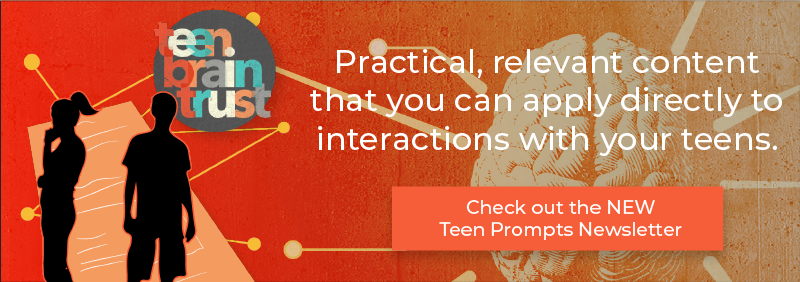[5:00 minutes to read]
Adolescence is tricky. Teens strive the most to find their unique selves. They also face off with one of the most major developmental tasks out there - creating their very own identity.
It’s important that teens see themselves as completely separate individuals from their parents. This can potentially open up a whole slew of complications. It can become much more difficult for parents to connect with them, partner up with them, or sometimes even get them to answer simple questions like, 'Did you have a good day at school?'.
This article dives into Open-Ended Questions, what they are, how they get teens to open up more, and how you can use them in your conversations. Let’s dive in!
Open-Ended Questions: The Trick To Getting Teens Engaged in Conversation
Open-ended questions are an awesome tool for any conversation, but they’re especially effective, if properly deployed, when talking to teenagers.
We want to explain why and give you the tools you need to start using open-ended questions to prompt better conversations with your teen.
What Are Open-Ended Questions?
To get clear on what open-ended questions are, let’s first tackle closed-ended questions.
Closed-ended questions offer respondents a fixed set of choices to select from.
Most commonly, these are yes or no questions. Closed-ended questions sound like “Did you make your appointment?”, “Have you submitted your application for that job we talked about?”, or “Have you done your homework?”.
Asking questions in this format puts teens in a position to answer with either the ‘right’ or ‘wrong’ answer, which can cause them to become defensive. It also gives them an opportunity to answer the question without fully engaging in the conversation.
Getting one-word answers from your teen all the time may be a sign that you’re asking too many closed-ended questions.
Open-ended questions invite the person being questioned to create a custom response.
The open-ended cousin of “Did you have a good day at school?” might be “What was your favorite thing that happened today?”.
Answering the second question requires reflection and a moment of genuine thought. A closed-ended question can be answered reflexively but an open-ended question engages the thinking part of our brain. Which has a ton of benefits, especially for teens.
A few more examples of closed vs. open-ended questions before we move on:
‘Did you finish your homework?’ = Closed-Ended Question
‘Where are you with your homework for today?’ = Open-Ended Question
‘Did you do well on your test?’ = Closed-Ended Question
‘How do you feel the test went today?’ = Open-Ended Question
These differences may seem nuanced or minor but they have the potential to hugely impact how our teens perceive conversations with us.
Why Do Teens Respond Better to Open-Ended Questions?
As we mentioned above, one of the major developmental milestones teens have is to experiment with and create their own identity (separate from their parents).
Open-ended questions satisfy this developmental need teens have in several ways:
First and foremost, open-ended questions demonstrate conversational respect. Because they invite a considered response, when we ask teens open-ended questions we imply that we’re genuinely interested in their thoughts, opinions, and/or experiences.
Teen’s fledgling egos crave and need respect, especially from their parents. Open-ended questions are a subtle way of letting them know we respect their individuality.
Secondly, open-ended questions engage teens’ prefrontal cortex or ‘Thinking Brain’. It requires reflection and an exploration of their own thoughts and opinions. While teens are often stereotyped as wanting to avoid serious thought or conversation, that is a misconception.
Teens shut down and avoid conversations where they feel like they DON’T have free reign to express their thoughts and opinions. They LOVE conversations where they are encouraged to experiment with their own thoughts and opinions before an engaged audience.
That doesn’t mean that your reserved teen will turn into a blabbermouth at the first sign of an open-ended question. But if we ask enough open-ended questions and genuinely listen to our teens answers, we’ll be surprised at how much more they start to open up.
Great Ways to Use Open-Ended Questions:
We recommend using open-ended questions in any and all conversations with your teen. However, changing our conversation habits takes time, effort, and practice (and maybe we don’t feel like it a lot of the time) so do as much as you can, when you can. To get started, here are some specific ways to think about using them with your teen:
1. Bonding with your teen
Whenever we get lucky enough to actually share leisure time with our teen (even if it’s just over dinner) and we want to bond, we can use open-ended questions to get them more engaged and interested in talking to us. BTW, we put a whole guide together on Encouraging Teens to Confide in You that you can download for free and should definitely check out.
2. Getting teens to share more
This is not about interrogating teens or manipulating teens into talking. This only works if we’re genuinely interested in what our teens have to say. But if we’re interested in how their day at school was, or how practice is going, or we want any kind of information about their life that they tend to withhold, we’ll have much more luck asking open-ended questions about their experience or how they’re doing, than by nagging them to share more.
3. Negotiating with our teens
Parenting teens means constantly being at odds with them about house rules, behavioral guidelines, our schedules, what they want to buy, and so many other countless things.
As the dominant members of the household, us parents usually default to setting the terms of any negotiation. If our teen asks to say out late, we respond automatically with ‘yes’, ‘no’, or ‘be home by X time’.
Open-ended questions offer an opportunity to create solutions that work for us AND that our teens are much more likely to adhere to. For example, if our teen asks to stay out late we can respond with, ‘What do you think is reasonable?’ Even if they come back with a totally unreasonable time, by letting them open the negotiation, they now have more ownership and buy-in around what the eventual result will be and are therefore much more motivated to uphold what is agreed upon.
Asking open-ended questions is also a great way to communicate concerns you have to your teen about what they want to do. If they say they want to be home by 2 AM, we might say no because they have school tomorrow, because we don’t want to stay up that late waiting for them, or any other number of reasons. Instead of launching into that though, we can ask ‘Why do you think I’m going to say no to that?’. Our teens likely know all of our concerns already, but by getting them to think about what our concerns are, they’re more likely to compromise with us and agree to a time we feel more comfortable with.
The bottom line, when our teens take an active role in negotiating with us they have a sense of ownership over the outcome and are more likely to be ok with it and adhere to whatever we agree on.
BONUS TIP from Dr. Dana Dorfman:
The first question you ask your teen when they get home is the most important thing you'll say to them all day. It lets them know, consciously or subconsciously, what you find to be the most important.
The next time you’re in conversation with your teen about their day-to-day, consider these questions instead of the old-fashioned “Did you have a good day at school?”
- What's something you want to tell me about your day?
- How do you feel about your day at school today?
- What was your favorite part of today?
- What was something fun that happened to you today?
Or even just “How did your day go?”
Share this Post


